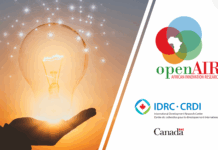By Esther Ekong
Africa is making her way fearlessly into the global center stage as new models of innovation, aiming to not only address the needs of low-income and marginalized communities but also to integrate them in development efforts, are gaining relevance both in academic and policy circles. The 4th AfricaLics Conference provided African researchers like me, the needed exposure to international knowledge in the field of innovation and development by presenting our work and meeting each other in a common place.
About AfricaLics
The African Network of Researchers in Learning, Innovation and Competence Building Systems (AfricaLics) is a network for researchers involved in innovation and development. The 4th AfricaLics International Conference took place from 22-24 October in Tanzania. The conference’s main theme this year was, “Innovation and transformative capacities for growth and sustainable development in Africa”. I was invited to present my paper entitled, “The role of trademarks in empowering rural women through their traditional knowledge: The case of Nigeria”.
At the point when academic and policy discourses around the world seem to be turning away from an emphasis on increasing productivity and growth, the African continent is at the height of its growth debate. At the center of this debate is the role that science, technology, and innovation should play in shaping the future of African countries. There is already a consensus that the kind of growth required must involve value addition to the continent’s abundant natural resources, including its agricultural products and medicinal plants. In this light, the AfricaLics conference had lively debates and important presentations that will hopefully influence these crucial, ongoing, continent-wide discussions.
Presenting at AfricaLics
Papers presented at the conference touched on a wide variety of topics ranging from appropriate policies for innovation and development in the era of Science, Technology and Innovation Strategy for Africa (STISA-2024), to Agenda 2063, the future of formal and informal economies, and more.
The panel I was on focused on the role of frugal innovation in sustainable development in Africa. I presented on intellectual property rights and frugal innovation, discussing how IP protection can be an enabler of frugal economies on one hand, but can also be used as a barrier to access. This opened up a discussion on how IP can be used to support the broad diffusion of innovations in an inclusive manner.
In addition to having the opportunity to present, the conference afforded me an opportunity to exchange ideas with other researchers and gain exposure to new perspectives on my research. I am very grateful to Open AIR for the opportunity to participate at the Conference. It was an academically rewarding experience and I had the pleasure of meeting with other current and past Open AIR researchers including Elvis Avenyo and Oluseye Jegede, who also presented papers at the Conference. The Conference lived up to the AfricaLics mandate, with stimulating presentations and discussions, all contributing to my understanding of innovation, learning, and capacity building in various African contexts.









